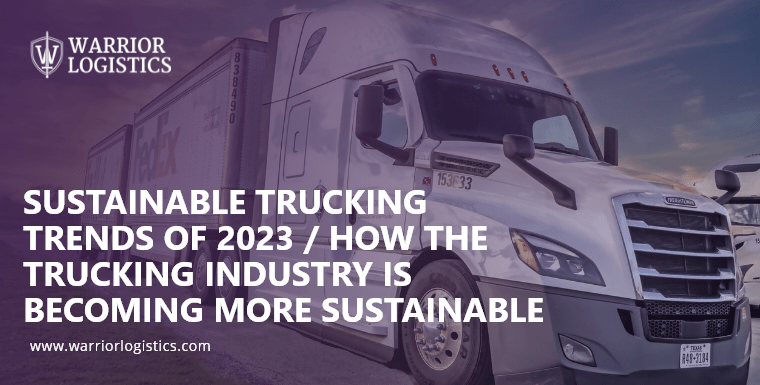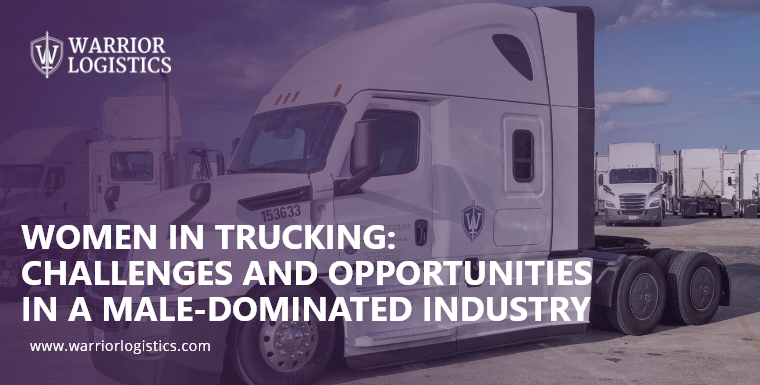Sustainable Trucking Trends 2023: What You Need to Know
As the world grapples with the consequences of climate change, the transportation industry is under increasing pressure to adopt sustainable practices. In particular, the trucking industry, which is responsible for moving goods across the country, has been identified as the top contributor to greenhouse gas emissions in the US.
However, the good news is that sustainable trucking is no longer just a pipe dream. Thanks to technological advancement, several sustainable trucking trends that are gaining momentum in 2023. In this article, we’ll take a closer look at these trends and what they mean for the trucking industry.
Introduction to Sustainable Trucking
Sustainable trucking refers to the use of environmentally friendly practices and technologies to reduce carbon footprint, waste, and fossil fuel consumption.
Since the trucking industry is the single largest contributor to CO2 emissions in the US, with diesel engines contributing to air pollution and carbon emissions, the sector is experiencing increasing pressure to adopt sustainable practices to mitigate the effects of climate change.
Sustainable Trucking Market Trends: Key Statistics
- The transportation sector contributes to about a third of US greenhouse gas emissions.
- The trucking industry consumes around 54.3 billion gallons of diesel fuel annually.
- In 2021, CO2 emissions from US transportation totaled 1.7 billion metric tons.
- Transportation is the largest source of greenhouse gas emissions in the US.
Sustainable Trucking Industry Drivers
The top three reasons behind sustainable trucking include:
- Rising fuel prices
- Government regulations
- Increased pressure to reduce carbon emissions from both public and private sectors
In March 2022, Convoy surveyed 700 small- and mid-sized trucking companies across the US to get a snapshot of sustainability in trucking. The survey participants included dispatchers, drivers, and owner-operators. Research showed that respondents reported feeling pressure to reduce carbon emissions rose from 35% to 38% between 2021 and 2022.
With the addition of rising fuel prices and government regulations, the pressure and need to reduce waste and achieve carbon neutrality is at an all-time high and will only increase in the coming years.
5 Sustainable Trucking Trends of 2023
Reduce Empty Miles
Inefficient truck routing contributes to wasted fuel consumption. Convoy research shows that up to 35% of truck miles may be empty, with regional driving distances (100-400 miles) representing the largest percentage of loads that are driven empty.
Reducing 1% of empty miles from one long-haul truck can save over 100 gallons of fuel. Trucking companies that optimize freight logistics can save fuel, time and enhance productivity, generating cost savings and additional revenue.
Alternative Fuels
One main way trucking companies address sustainability is by adopting alternative fuel vehicles to reduce emissions. 94% of the fuel used for transportation is petroleum-based. Electric, hybrid, and natural gas-powered trucks are rising in popularity as carriers look to transform into green trucking companies.
As long as the trucking and transportation industries are reliant on fossil fuels, some emissions cannot be avoided. However, introducing electric vehicles and alternative fuels can decrease emissions and help companies make their operations more sustainable.
This can include everything from biofuels to hydrogen fuel cells. While these fuels are still in the early stages of development, they have the potential to reduce the carbon footprint of the trucking industry significantly.
Electric Trucks
One of the most significant sustainable trucking trends in 2023 is the rise of electric trucks. Electric trucks are powered by batteries, meaning they don’t produce any emissions during operation. This makes them attractive for companies looking to reduce their carbon footprint if they have enough capital to invest in a new fleet.
Several major manufacturers, including Tesla and Daimler, are currently developing electric trucks, and it’s expected that the market for these vehicles will continue to grow in the coming years.
Efficient Routing
In addition to adopting alternative fuels and vehicle technologies, some trucking companies have begun using route optimization software to reduce fuel consumption and emissions. Companies can reduce idle time and empty miles by optimizing schedules, traveling during off-peak times, and avoiding routes with heavy traffic congestion.
Improved Aerodynamics
Finally, improved aerodynamics is another sustainable trucking trend that’s gaining momentum in 2023. Aerodynamics contribute up to 50% of fuel economy per mile at highway speeds.
By reducing drag and improving fuel efficiency, trucking companies can save on diesel costs, which translates to lower overall emissions. This can include everything from using streamlined trailers to implementing advanced technologies like platooning.
Sustainable Trucking Challenges
While major steps have been taken to reduce carbon emissions from trucking companies. Some significant barriers include:
- High initial investment in new trucking technologies prevents greater adoption for companies with fewer resources
- Ongoing truck driver shortage compounds issues of efficiency and route optimization
- Market availability of electric vehicles will likely outpace the building of charging infrastructure
Trucking companies will need to balance the ecological concerns of truck driving with the need to remain competitive and profitable. On the other hand, as the push for sustainability generates more momentum across all industries, green trucking companies can gain greater market share and be more appealing to potential customers.
Key Takeaways
In conclusion, sustainable trucking is no longer a distant dream. Thanks to technological advances, plans to reduce carbon emissions, and diesel fuel reliance, the sector’s carbon emission is set to reduce dramatically in the coming years.
From electric trucks to improved aerodynamics, these trends have the potential to massively reduce the carbon footprint of the trucking industry. As we look toward the future, it’s clear that sustainability will be a key factor in the success of the trucking industry.
How Will Sustainable Trucking Affect Professional Truck Drivers?
As the trucking landscape evolves, it’s becoming increasingly important to cultivate a workforce of experienced, professional truck drivers to take the helm.
Professional truckers are the backbone of our economy, and trucking companies must prioritize their needs as they work to make their operations more sustainable. At Warrior Logistics, people are our first priority. Our strategic and ongoing expansion means we stay on the cutting edge of technologies to ensure our Truck Warriors have everything they need to be successful on and off the road.
Move your truck driving career forward with one of the nation’s largest transportation companies – apply today!



